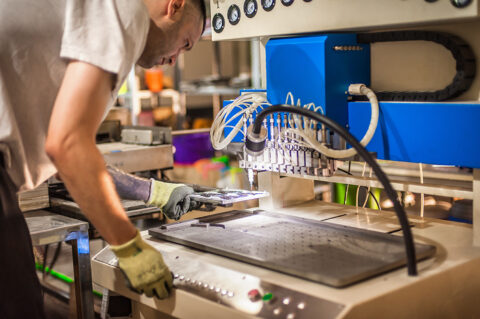In the latest episode of the Manufacturing Executive Podcast, host Joe Sullivan sits down with Bekas-enti, co-founder and CEO of Reframe Systems, to explore how the company is reshaping the homebuilding industry with advanced robotics and micro-factories. Bekas-enti shares his journey from disrupting fixed automation at Amazon Robotics to tackling the housing crisis and climate change through Reframe Systems’ innovative approach to construction.
The current state of the construction industry is fraught with inefficiencies and high costs, with a fragmented process involving 20-25 subcontractors. Bekas-enti highlights the potential for a 50% cost reduction through industrialization and process improvements, a stark contrast to other manufacturing industries where labor accounts for less than 10% of the total cost.
“If you compare contrast that to the cost of the car or a toaster less than 10% of the cost of that is cost of direct labor, everything else is materials. To this suggests that if you apply the right industrialization principles, you should be able to drive that 65% labor plus overhead down to 10% over time and be able to also maybe even drive efficiencies on materials that you can actually start at the very least get to 50% reduction in cost of building a home.”
Reframe Systems’ mission is to build climate-resilient homes that are attainable for all by industrializing construction through local manufacturing and micro-factories. The company embraces mass customization to meet site-specific conditions and building codes, using software-defined manufacturing with robots, AI, and simple endpoints for instructions.
Bekas-enti emphasizes the growing demand for infill housing and missing middle housing, which aims to increase density in existing neighborhoods with access to services and transit. Mass customization plays a crucial role in making infill housing affordable and scalable, addressing the challenges of building in existing neighborhoods compared to greenfield development.
Emerging technology is also key to reducing dependency on skilled labor, with screen-based workflows and digital training attracting a new generation of workers. Closed-loop quality checks using computer vision and AI algorithms help reduce risk and learning curves for apprentices and newly skilled workers.
“We’re finding the opportunity today in how to apply in our case of the screen based workflows that feel very natural for the screen based generation, who is graduating out of high school these days. They actually come into a work environment where it feels more digital than it feels physical and we’re finding that this is a path to actually start using the same screens to train them on how to do their jobs while having access to software that does your QH checks the background.”
To remain competitive in the face of global competition and slim margins, Bekas-enti stresses the importance of rethinking entire processes and focusing on high-value, complex products. By leaning into high-mix, high-volume production and mass customization, companies can build a competitive advantage through unique offerings and customization.
Managing change and resistance in the supply chain is another critical aspect of Reframe Systems’ approach. The company uses traditional building materials to minimize risk for customers and suppliers, targets developers as customers to avoid change management hurdles with general contractors, and focuses on building maturity in their stack before selling to a wider range of customers.
Looking ahead, Bekas-enti envisions a future where mass customization becomes the norm in manufacturing, with a shift from assembly lines to multiple cells and matrices working together. This transformation, he believes, will drive increased adoption of technology and a reduction in resource usage, with an impact comparable to the shift from analog to digital.
To learn more about Reframe Systems and their groundbreaking work in the homebuilding industry, visit their website at reframe.systems or follow them on LinkedIn.




